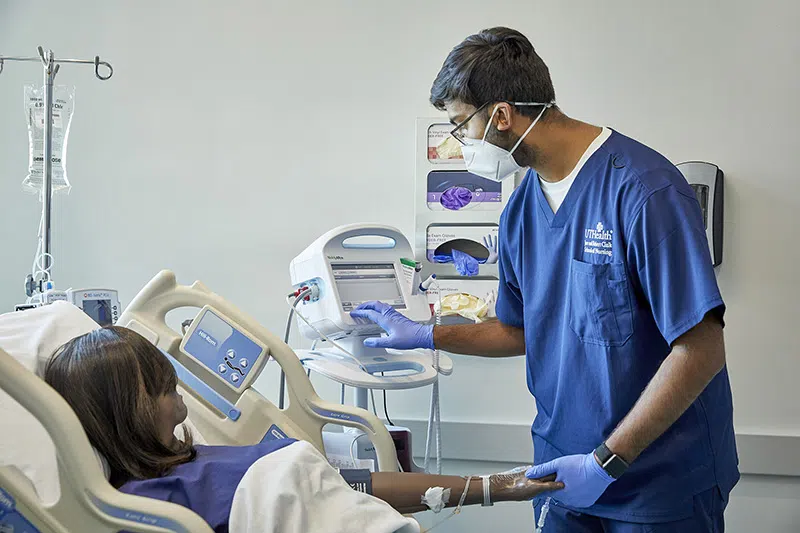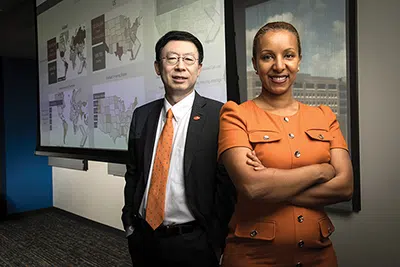PREAMBLE
ARTICLE 1
Name of Body
The body shall be known as the Interfaculty Council (hereinafter known as the IFC).
ARTICLE 2
Purpose and Responsibilities
The purpose of the IFC shall be to investigate, assess, deliberate, and recommend action on matters important to the several faculties of UTHealth Houston, emphasizing, but not limited to the following areas:
Section 1. Faculty Governance and Academic Affairs
The IFC will assess the scope of faculty responsibility over governance and academic matters within UTHealth Houston and each of the schools at least every five years and, when necessary, recommend that the President re-establish or reaffirm these responsibilities in cases where they are not currently being fully assumed. The criteria for such assessment will be drawn from the UTHealth Houston Statement on Governance - appearing as Appendix 1 to this document - that affirms primary faculty authority in curriculum, the subject matter and methods of instruction, research, faculty status, and aspects of student life related to the educational process. The IFC will maintain an active liaison with the faculty governance organizations of the schools and exchange information on their respective activities and initiatives.
At the institutional level, the IFC serves as the primary agency for faculty participation in governance. The IFC shall be the primary representative of faculty interests and communicate directly with the President of UTHealth Houston. It may elaborate a position or positions on matters referred to it by the President, on matters generated within any of the constituent schools or their faculties, or on matters generated within the IFC. Its recommendations, if any, shall be forwarded to the President in writing.
Section 2. Faculty Status, Rights, and Responsibilities
The IFC will investigate instances of curtailment of faculty prerogatives, infringement on faculty rights, interference in the discharge of faculty responsibilities, and/or attenuation of faculty status and welfare in the schools and recommend measures to the President and appropriate faculty governance organizations for their protection and restoration.
Section 3. Administrative Affairs
The IFC will serve as a liaison between the faculty and the administration for disseminating and exchanging information on institutional strategic planning, operational budget planning and priorities, institutional management and effectiveness, and other UTHealth Houston-wide administrative activities. The IFC will monitor, and when appropriate, represent faculty interests in the deliberation over UTHealth Houston-wide administrative policies and priorities.
ARTICLE 3
Membership
Section 1: Composition of Membership
Each UTHealth Houston school, except the Graduate School of Biomedical Sciences, shall have a minimum of four representatives. These representative counts exclude the members on the IFC Executive Committee. Of these four, at least two shall be selected at-large and at least one, but no more than two, shall be elected officers or designees of each school's faculty-elected governance organization. Schools with more than 200 FTE faculty shall select one additional at-large representative for each 200 FTE faculty beyond 200. The Graduate School of Biomedical Sciences shall have two representatives selected by the Graduate Student Education Committee of UTHealth Houston from among its membership.
Section 1.a: Transition of School Representation Numbers as a Result of Bylaw Change
In the circumstance that the number of at-large members allowed from each school decreases due to a relevant change in the Bylaws, reduction in number of at-large members from each school to meet new Bylaw criteria will occur as incumbent at-large members reach the completion of their current term. At-large positions whose current term are to expire the soonest will be eliminated at the end of the current term,until the appropriate total number of at-large members, according to the Bylaws, from each school is achieved.
Section 2: Eligibility for Membership
To be eligible for service on IFC, a faculty member must have a primary appointment at UTHealth Houston at the rank of instructor and above. Additionally, the faculty cannot hold a major administrative appointment at the university (e.g., Vice President), school (e.g., Dean, Associate Dean, Assistant Dean), or department (e.g., Chair, Vice Chair) level. In the event a faculty member already serving on IFC is appointed to a major administrative role, they may continue their service on IFC until the end of the academic year. A faculty member with joint appointments at two or more operating units of UTHealth Houston is eligible to represent only the institution with which they are primarily associated.
Section 3: Election Procedure
Prior to September of each year, the appropriate number of at-large IFC representatives shall be selected by the faculty governance organization of each school in UTHealth Houston. The Secretary, on behalf of the IFC Chair, shall notify the chair of each school's faculty governance organization when this selection should occur and indicate the appropriate number of at-large representatives to be chosen. The nomination and selection process shall be monitored by the incumbent IFC members, and shall follow the established selection procedures within each school's faculty governance organization. The chair of each school's faculty governance shall inform the IFC Secretary of the selection results and any other changes in the school’s delegation prior to the September IFC meeting.
Section 4: Term of Office
There is no limit to service for IFC members serving based on their status as officers of their respective school’s faculty governance organizations. At-large IFC members may serve a maximum of six consecutive years, ignoring any intervening years in which they served based on their status as an officer of their school faculty governance organization or as IFC Chair, Chair-Elect, or Past Chair.
Section 5: Vacancies
Unexpired terms of at-large IFC members and unexpired terms of school faculty governance organization officers shall be filled using the applicable selection mechanisms designated in the school's faculty governance organization bylaws.
Section 6: Loss of IFC Appointment
Any member of IFC, other than ex officio, who is absent from three consecutive or four total regular meetings during an academic year shall forfeit their position and be replaced by another representative of the school using the procedures for filling vacancies in Article 3, Section 5 of these bylaws. The Secretary of the IFC shall monitor attendance and implement loss of appointment procedures on behalf of the Chair. A member may select another faculty member to represent him/her at a meeting; however, an alternate representative may be used for no more than three IFC meetings per year.
Section 7: Ex Officio Membership
- The immediate prior Chair (“Past Chair”) shall continue to serve on the IFC as an ex officio member and adviser for one year after expiration of their term as Chair (or longer if necessary, see Article 4, Section 4). The Past Chair shall have privileges of the floor, but shall not have the right to vote.
- The Vice President of Faculty Affairs shall serve on the IFC as an ex officio member, but shall not have the right to vote.
- Members of the University Classified Staff Council and the Student InterCouncil shall act as liaison with their respective bodies. One ex officio representative each shall be selected from the membership of their respective council. These individuals shall have privileges of the floor, but shall not have the right to vote.
- The President of UTHealth Houston shall appoint one or more representative(s) from the staff to serve as the Secretary of the IFC. The Secretary shall have privileges of the floor, but shall not have the right to vote. The function of the Secretary shall be to assist with the preparation and distribution of minutes, agendas, and other documentation as well as to provide administrative support as required to facilitate the work of the IFC.
- In the event a UTHealth Houston faculty member who is not already serving as a member of the IFC is elected to serve as an officer (Chair-Elect, Chair, Past Chair, or Secretary) of the UT System Faculty Advisory Council (UTFAC), during the term of such UTFAC service, they may also choose to serve as an ex officio member of the IFC. In this ex officio IFC role, this member shall have the privileges of the floor, but shall not have the right to vote. The UTFAC officer, regardless of whether they are also serving as ex officio member of the IFC, shall be invited to give periodic reports to the IFC.
ARTICLE 4
Officers of the IFC
Section 1: Definition of the IFC Executive Committee
The IFC Executive Committee is identified as the Chair, Chair-Elect, and Past Chair leadership positions, further described in these Bylaws under Article 4, Section 2: Chair and Article 4, Section 3: Chair-Elect and Past Chair.
Section 2: Chair
The duties of the Chair shall include presiding at meetings, chairing the Executive Committee of the IFC, calling meetings, appointing IFC members to standing and ad hoc committees, reviewing the minutes prior to distribution, preparing a year-end report, and otherwise facilitating and directing the affairs of the IFC, including representing the IFC at other forums. The Chair shall not participate in voting, except in the circumstance that there is a tie vote. In the circumstance of a tie vote, the Chair shall cast the tie-breaking vote. The term of office shall be for one year. A Chair may be elected to a subsequent term after an interval of one or more years after completing their term as Past Chair.
Section 3: Chair-Elect and Past-Chair
The duties of the Chair-Elect shall be to serve as a parliamentarian, participate in voting on the IFC, and serve on the IFC Executive Committee. In the absence of the Chair, the Chair-Elect will preside at meetings and otherwise carry out the duties of the Chair. The Chair-Elect will assume the Chair position of the IFC after the completion of a one-year term. The Chair will assume the ex officio Past Chair position of the IFC after the completion of a one-year term.
Section 4: Election of Officers
The Chair-Elect shall be elected by IFC members between its June and July meetings for a term of one year. Nominees for Chair-Elect shall be chosen by self-nomination or from nominations from among the current members by the June meeting. All current IFC members in good standing who have a full-time appointment at UTHealth Houston are eligible for nomination.
Each nominee will provide a short description of their proposed role and future plans for the IFC. Voting for the Chair-Elect position shall be conducted electronically using ranked-choice voting. All members of the IFC, both incoming and outgoing, are encouraged to attend the September meeting at which officers are installed.
In the event the Chair does not complete their term of office, the Chair-Elect shall succeed to that office to complete the Chair's unfinished term. In addition, the Chair-Elect will then serve their complete term as Chair, while the prior Past Chair will continue their role as Past Chair for another term In the event the Chair-Elect does not complete their term of office, the IFC shall elect a member to serve as Chair-Elect.
The UTFAC representatives will be the Past Chair and Chair of the IFC. The Chair-Elect will serve as the alternate. If one of these representatives cannot serve, an alternate will be chosen by the IFC membership.
ARTICLE 5
Meetings
Section 1: Regular
There shall be at least nine regular meetings of the IFC in each calendar year. The Chair shall be responsible for setting the schedule, location, format (e.g., in-person, virtual), and attendance requirements of the meeting.
Section 2: Special
Special meetings may be called by the Chair or on the written request of four or more members of the IFC. Special meetings must be scheduled at least 72 hours in advance and on a regular working day.
Section 3: Agenda
The agenda for regular meetings shall include a call to order, determination of a quorum, approval of minutes of previous meeting(s), old business, new business, committee reports, and adjournment.
Section 4: Quorum
A quorum shall be at least one-third of the total IFC membership present as well as at least four of UTHealth Houston schools having at least half of their total delegation present.
Section 5: Voting
Matters requiring a vote will typically occur at meetings of the IFC. At the discretion of the Chair, electronic voting can be used in place of or in conjunction with in-person voting at IFC meetings. Unless otherwise stipulated by these Bylaws, matters shall be decided by a simple majority of voting members if a quorum is present.
Section 6: Minutes
The Secretary of the IFC will provide for recording the minutes of all IFC meetings.
ARTICLE 6
Committees
Standing committees shall be established that are functionally related to the purpose and responsibilities of the IFC as delineated in Article 2.
Section 1: Governance and Academic Affairs Committee
The Governance and Academic Affairs Committee will deliberate on issues of governance and academic affairs. From time to time, the committee will assess the scope of faculty responsibility over governance and academic matters in UTHealth Houston and in each of the schools. The criteria for such an assessment of governance matters will be drawn from the UTHealth Houston Statement on Governance. Academic matters that the committee will review include educational goals, curricula, and procedures of student instruction in each of the schools.
Section 2: The Faculty Status, Rights, and Responsibilities Committee
The Faculty Status, Rights, and Responsibilities Committee will deliberate on issues of faculty status, rights, and responsibilities and when necessary, investigate instances of curtailment of faculty prerogatives, infringement of faculty rights, interference in the discharge of faculty responsibilities, and/or attenuation of faculty status and welfare in the several schools and will recommend measures to the IFC, the President, and faculty governance organizations for their support, protection, and restoration.
Section 3: Administrative Affairs Committee
The Administrative Affairs Committee will deliberate and make recommendations to IFC as well as serve as a liaison between the faculty and the administration for dissemination and exchange of information on institutional strategic planning, operational budget planning and priorities, institutional management and effectiveness, performance appraisal of administrators, and other UTHealth Houston-wide administrative activities. The committee will monitor and, when appropriate, recommend measures dealing with UTHealth Houston-wide administrative policies and priorities.
Section 4: Executive Committee
The Executive Committee is defined in Article 4, Section 1. The function of the Executive Committee shall be to determine the agenda of IFC meetings, develop operating procedures and/or bylaws as required, establish rapport, coordinate with external agencies or individuals to facilitate the work of the IFC, and to provide guidance and direction to the IFC.
Section 5: Ad Hoc Committees
The Chair shall be empowered to appoint ad hoc committees from time to time to deliberate and make recommendations on issues of special interest to the IFC. Ad hoc committees shall remain empaneled only until their business is completed or until the end of the academic year, whichever comes first.
ARTICLE 7
Amendments and Adoptions
Amendments shall be submitted in writing, must be presented at two consecutive meetings, and may be adopted at a regular or special meeting by a two-thirds vote of voting members provided that a quorum is present. Amendments will take effect immediately upon adoption.
Updated 07/04, 03/07, 08/08, 12/13, 06/17, 06/18, 01/25










